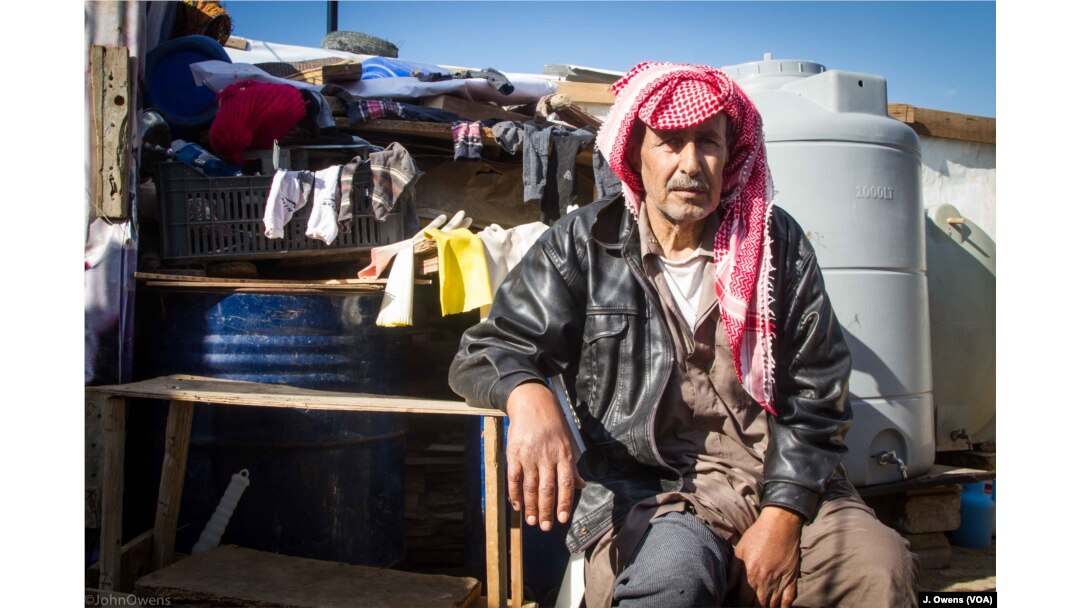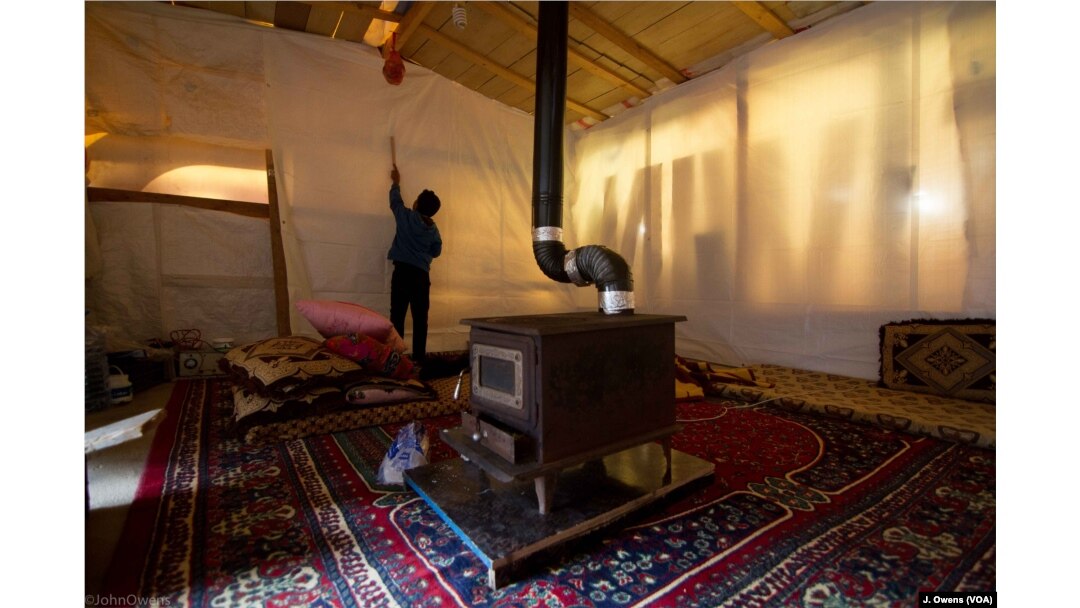Concerns are growing as winter approaches and more Syrian refugees in Lebanon are driven by debt into makeshift shelters.
Aid agencies are attempting to reduce the potentially devastating consequences of freezing conditions and snowstorms that killed eight last year, including three Syrian refugees.
Many refugees are reliant on handouts because governments restrict their ability to provide for themselves.
Memories of last Winter are still fresh for father-of-seven Redwan al-Omar, who has endured two winters in a refugee camp in Lebanon's Bekaa region since fleeing Aleppo.

Redwan al Omar fled Aleppo in Syria for Lebanon more than two years ago. A sufferer of diabetes, he despairs of the coming winter.
Sitting outside the makeshift tent made of canvas and wood that constitutes a home for him and his family, he told VOA, “We ran out of wood, it was very cold and it was very hard. We were short of a lot of things, and the tent even fell on us because of the snow. We need all kinds of help. Our house is like a beggar’s.”
For the 55-year-old, whose eyesight and health have been wracked by diabetes, it can all seem too much.
“We don’t have money, how can I see a doctor? If you are a stranger, no one helps you. I just want to die,” he said.
Omar is not the only one for whom money is a problem, and for whom the lack of adequate shelter will make Winter difficult.
The number of refugees forced to live in "housing" barely able to keep out freezing conditions has shot up in recent years.

More and more refugees are being forced into homes like this one as they run out of savings.
According to the U.N. refugee agency (UNHCR), 55 percent live in insecure shelters such as unfinished buildings, garages and the kind of camps that Omar’s family call home, up from 40 percent last year and 35 percent in 2013.
Meanwhile, 90 percent of refugees in Lebanon are in debt, with the average amount of money owed rising by 22 percent this year.
“As debt increases you see a vicious cycle for refugees,” said UNHCR spokeswoman Dana Sleiman. “Many who could afford to live in an apartment last year are having to downgrade to a tent. We are seeing a whole population slipping into less secure shelter, and those without the infrastructure are more exposed to the elements.”
Aid agencies such as the UNHCR partner up to provide help to refugees ahead of the winter.
Stopped from working
Some see policies of the Lebanese government as part of the negative spiral.
Since the start of this year, restrictions have been introduced to cope with a refugee presence officially estimated at 1.1 million, but thought to be far higher.
Many Syrian refugees are being required to sign a pledge not to work by the Lebanese government.
Meanwhile, as temperatures drop, costs for things like fuel increase, as does the threat to the health of those enduring the conditions.
“I am afraid winter this year could be terrible, because they’re predicting more storms,” said Sleiman Gaber, who co-ordinates a project to assist refugees in the winter for Italian non-governmental organization INTERSOS in the Bekaa region.
Lebanon's Bekaa Valley is home to an estimated 371,000 refugees. There are a total of 1.1m refugees registered in Lebanon, but the actual number is thought to be considerably higher.
Syrians in Lebanon face a “lack of opportunities” when it comes to finding jobs, added Gaber, making even tougher the struggle to stay warm, fed and sheltered over winter.
The consequences of exposure can be fatal. Last January, snowstorms swept through parts of Lebanon, leaving three Syrians, including a child, dead.
Shifting aid
Across Lebanon, assistance is coming in forms such as clothing and provisions to re-enforce shelter.
A Syrian women registers her details ahead of collecting items provided to help protect the refugees' makeshift shelters against the elements this winter.
But for many humanitarian organizations this winter, the focus is shifting to giving refugees money through agency-issued cash cards.
“This empowers them and allows them to choose how they purchase winter goods according to their own needs,” explained Sleiman.
Though donor fatigue continues to plague humanitarian agencies, with efforts to respond to the crisis perpetually underfunded, recent events have given some cause for hope.
Following a summer that saw refugees’ efforts to reach Europe hit the headlines, in October the European Commission sought to double support for agencies like UNHCR to more than $1 billion.
Sleiman said that the cash card program is reaching more than 150,000 families, nearly twice as many as last winter, while adding that new donors had made contributions in recent months.
For Mariam Farah Ramadan, whose tent is just a stone’s throw from that of Redwan al-Omar, one thing is certain, the wooden supports and reinforcement just distributed are likely to prove vital for her and her six children.
Mariam Farah Ramadan, who arrived in Lebanon from Syria last year. She hopes that, with help, this winter will be easier than the last one.
Upon arriving in Lebanon last year, Ramadan and family faced “freezing conditions” with the bare minimum to survive on.
“Last winter was hard,” she said. “It was very cold at night and we didn’t have blankets.”
Now, with plastic sheets for waterproofing and wood to help support the roof, she is hoping the this year will not prove quite so tough.
“This kind of help is very important,” she said.

